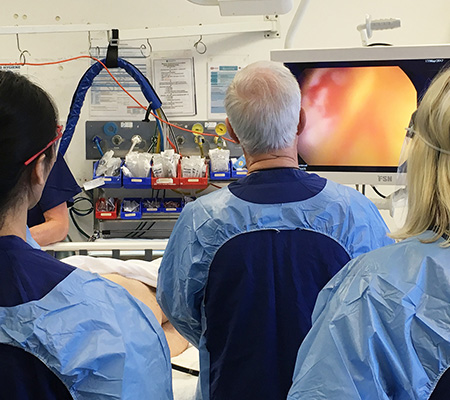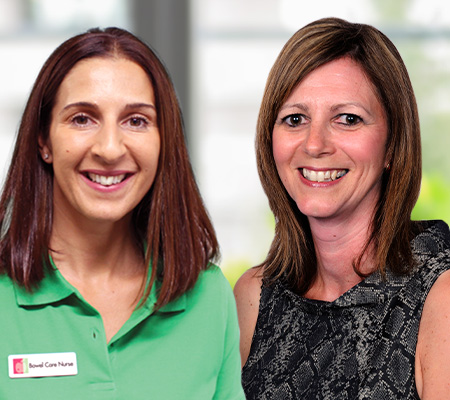Never2Young is an initiative of Bowel Cancer Australia, providing resources uniquely designed for younger people. Helping younger Australians to better understand their bowel cancer risk and to take appropriate action, raise much-needed awareness and receive dedicated support that is tailored to the needs of early-onset patients.
Factors like My Genes, My Family, My Health, My Body, My Lifestyle and My Right can all play a contributing role when it comes to bowel cancer in younger people.


- Greater awareness: among the community and health professionals of early-onset bowel cancer.
- Lower screening age: in response to the increasing rates of bowel cancer in younger people.
- Prompt GP referral: to a colonoscopy for all younger people who present with symptoms that may be consistent with bowel cancer.
- Improved pathways: that ensure timely triage, diagnosis and treatment for younger people.
- Better understanding: the challenges of early-onset bowel cancer to improve and tailor treatment, support and care for younger patients.
- Further research: into the causes of early-onset bowel cancer, that has the potential to improve survival and/or help build a path toward a cure.
Help us to challenge perceptions and create a powerful voice for change by sharing our Never2Young Advocacy Agenda and your lived experience.
- 1,716 Australians under age of 50 are diagnosed with bowel cancer each year (11% of all bowel cancer cases).
- 315 people under age 50 die from bowel cancer each year (5.8% of all bowel cancer deaths).
- 50.8% of early-onset bowel cancer cases are diagnosed in females, and 49.2% in males.
- Over 86% of people diagnosed with early-onset bowel cancer experience symptoms.
People born in 1990 onwards have double the risk of colon cancer and quadruple the risk of rectal cancer compared with people born in 1950.
- Over the past three decades there has been a 266% increase in bowel cancer incidence rates in adolescents and young adults (15-24 years).
- Bowel cancer is the fifth most common and seventh deadliest cancer for people aged 15-24.
- The proportion of bowel cancer located in the appendix was 85% for people aged 15-24 compared to only 3% for people older than 24.
- More females than males aged 15-24 developed bowel cancer.
- The five-year relative survival for people aged 15-24 was 96% (2014-18), which means adolescents and young adults have around a nine in ten chance of surviving five years after diagnosis relative to comparable people in the general population.
Although many of the symptoms of bowel cancer are common to multiple health concerns, please do not accept "you're too young to have bowel cancer" as an explanation for your symptoms, ask your doctor to be referred for further investigations.
Published in the ANZ Journal of Surgery (8 June 2020), a Gold Coast study found growing evidence of increasing rates of bowel cancer in people under age 50 after reviewing 557 patients who received a colonoscopy between 2013 and 2017.
The findings correlate with published research in the Lancet Gastroenterology & Hepatology (May 2019), that found the number of people under age 50 diagnosed with colon (2.9%) and rectal (2.6%) cancer increasing significantly each year in Australia.
Of the top 10 cancers in Australia, bowel cancer is the only cancer that showed an increase in mortality rates from 2008 to 2018, projected to 2021 for people aged 45-49.
A 45-year-old today has the same bowel cancer risk a 50-year-old had 10 years ago.
Screening from 45 has been shown to be potentially cost-effective for the National Bowel Cancer Screening Program, would reduce the number of bowel cancer cases and deaths, and increase demand for colonoscopy services, depending on participation.
Australia can’t afford to wait another 12 years for our medical guidelines to be updated before taking action.
If you or a loved one, no matter your age, are experiencing bowel cancer symptoms, talk with your GP and advocate for your own health.
Knowing your family history is also vital. You may need to begin screening even earlier depending on your individual circumstances.
Bowel Cancer Australia recognises lowering screening guidelines is one step forward for people aged 45 and older, but it doesn’t address the rise in early-onset bowel cancer, which is now the sixth leading cause of death for Australians aged 25-44.

In October 2020, the American Gastroenterological Association (AGA) published a new clinical practice update on young adult-onset bowel cancer that provides best practice advice that has been shown to work effectively and produce successful outcomes, which can be immediately implemented in patient care.
- BEST PRACTICE ADVICE 1 - With the rising incidence of people developing bowel cancer before 50 years of age, diagnostic evaluation of the colon and rectum is encouraged for all patients, irrespective of age, who present with symptoms that may be consistent with bowel cancer, including but not limited to: rectal bleeding, weight loss, change in bowel habit, abdominal pain, iron deficiency anaemia.
- BEST PRACTICE ADVICE 2 - Specialists should obtain family history of bowel and other cancers in first- and second-degree relatives of patients with young adult–onset bowel cancer and discuss genetic evaluation with germline genetic testing either in targeted genes based on phenotypic presentation or in multiplex gene panels regardless of family history.
- BEST PRACTICE ADVICE 3 - Specialists should present the role of fertility preservation prior to cancer-directed therapy including surgery, pelvic radiation, or chemotherapy.
- BEST PRACTICE ADVICE 4 - Specialists should counsel patients on the benefit of germline genetic testing and familial cancer panel testing in the pre-surgical period to inform which surgical options may be available to the patient with young adult–onset bowel cancer.
- BEST PRACTICE ADVICE 5 - Specialists should consider utilising germline and somatic genetic testing results to inform chemotherapeutic strategies.
- BEST PRACTICE ADVICE 6 - Specialists should offer hereditary bowel cancer syndrome specific screening for bowel cancer and extra-colonic cancers only to young adult–onset bowel cancer patients who have a genetically or clinically diagnosed hereditary bowel cancer syndrome. For patients with sporadic young adult–onset bowel cancer, extra-colonic screening and bowel cancer surveillance intervals are the same as for patients with older adult–onset bowel cancer.
The update states that the signs and symptoms that prompt healthcare providers to consider a diagnostic bowel exam for a person over 50 should prompt a diagnostic colonoscopy exam for the person under 50 years of age.

Many young bowel cancer patients say that they can feel quite alone and isolated when first diagnosed with bowel cancer and during their bowel cancer journey.
Often because there is a common misconception in the community that bowel cancer only affects older people and also because many of the other bowel cancer patients they encounter during treatment are older.
Parents with young children, people just starting out in their career, singles, university students and newly-weds – younger bowel cancer patients can quite often be in a different life stage to those diagnosed at an older age.
Having a child diagnosed with bowel cancer can also be very difficult.
The ability to talk with others who know what you are going through can be very helpful, and that is what Bowel Cancer Australia's Peer-to-Peer Network is all about – connecting people living with or beyond bowel cancer and loved ones with others in a similar situation.
Sharing your story and experiences to raise awareness and help others is also a big part of Bowel Cancer Australia's Peer-to-Peer Network.
You can read the inspiring bowel cancer stories of many young bowel cancer patients and their loved ones and/or submit your story here.
| N2Y Awareness
If you are living with or beyond early-onset bowel cancer, or are a loved one, and would like to become a #N2YChampion,
please register your interest on our contact us webpage.














